Vanderbilt University announced today the creation of the Vanderbilt Center for Research on Inequality and Health, a trans-institutional collaboration of the College of Arts and Science and the School of Nursing. The center will convene leading Vanderbilt researchers with deep expertise in economic and social inequality, population health science, LGBTQ+ health policy and gun violence to explore the health impacts of these interrelated areas of study.
Led by international subject matter experts, the center’s scholarship will deepen society’s understanding of the causes of health-related inequalities, how they intersect and how they affect population health. The center’s research will inform potential solutions to these challenges through advocacy, intervention and public policy. The center is part of Discovery Vanderbilt, an initiative of the Office of the Provost and one of three pathways in the university’s Dare to Grow campaign to support and extend the resources underpinning Vanderbilt’s most innovative research and education.
“It’s so exciting to support this center’s launch as part of Discovery Vanderbilt,” Provost C. Cybele Raver said. “This represents a bold step forward in our unwavering commitment to addressing crucial societal issues through collaborative research and interdisciplinary exploration.”
The Center for Research on Inequality and Health will be led by Christopher “Kitt” Carpenter, E. Bronson Ingram University Distinguished Professor of Economics and Health Policy. Tara McKay, assistant professor of medicine, health and society, and Shelagh Mulvaney, associate professor of nursing and biomedical informatics, will serve as associate directors. The center will be in expanded, renovated space on the third floor of Buttrick Hall, in the center of Vanderbilt’s historic core, allowing for even more collaboration and interdisciplinary exploration.
“I am honored to lead this innovative effort to connect and amplify Vanderbilt’s outstanding scholarship on inequality and health,” Carpenter said. “From our new physical space, to hiring exceptional new faculty, to fostering new collaborations across disciplines, the center is well-positioned to be a global leader in this area.”
An event to mark the center’s launch will be Monday, Sept. 18, at 5 p.m. CT at Sarratt Cinema. It is open to Vanderbilt and VUMC community members; advance registration is required.
“This center will be important not only as an intersection of scholarly disciplines, but also as an intersection of ideas—a place to discuss and debate these urgent topics with the aim of arriving at applicable solutions,” Chancellor Daniel Diermeier said.
CRIH Featured Research
Mulvaney, an expert in digital health equity, is working with colleagues in the School of Engineering Institute for Software Integrated Systems and the University of Kentucky to improve nutrition and obesity-related inequalities. Mulvaney and the UKY team recently developed an app called Children Eating Well, or CHEW, that encourages healthy shopping and cooking, nutrition education, family health behavior goal setting and family mealtimes. The program, funded by the U.S. Department of Agriculture, will be implemented in Head Start centers throughout Kentucky this year.
Julie Ward, assistant professor of medicine, health and society, is an expert on public opinion about firearms in the U.S. With her existing collaborators at Johns Hopkins University and with new collaborators at the CRIH, Ward will investigate questions related to firearm ownership and racial equity through the National Survey of Gun Policy and new research avenues. These data will offer insight into racialized experiences of firearm victimization, ownership and related risks that inform and shape public policy and the national conversation about firearms.
Carol Ziegler, professor of nursing and recently appointed member of the Metro Nashville Board of Health, will work to address climate-related health inequalities in Nashville and beyond. With her community partners, colleagues and undergraduate students working on immersion projects, Ziegler will design and prototype initiatives to leverage carbon offset dollars with social impact, to boost investments in lower carbon emissions and to promote economic, physical and mental health for low-income families in Nashville.
Other questions the center will explore include: How did state policy environments shape mental health during the COVID-19 pandemic? What does changing public opinion on carrying guns in public spaces mean for population health and well-being? How are adverse childhood experiences related to educational and health outcomes later in life? Does having access to an affirming health care provider improve health outcomes for LGBTQ+ people?
“The center represents an innovative approach to addressing one of the most pressing issues of our time,” said Timothy P. McNamara, interim dean of the College of Arts and Science. “We are proud to collaborate with our esteemed colleagues in the School of Nursing, bringing together leading experts across disciplines to address health inequality.” Dean of the School of Nursing Pamela Jeffries continued: “This partnership between our two schools illustrates what Vanderbilt does best: radical collaboration that leads to greater discovery and solutions to global challenges. I look forward to seeing how the cutting-edge scholarship coming out of the center will make a real difference in the lives of individuals, communities and populations.”
The center will host seminars, workshops and symposia in the coming months. Students, researchers and interested community members can learn more about the center’s programming and how to get involved at the website.
About Christopher “Kitt” Carpenter
Carpenter is a health and labor economist who studies the effects of public policies on health and family outcomes. He has specific expertise in LGBTQ+ demography and health policy evaluation. He is a member of the National Academy of Medicine and has received major grants from the National Institute on Child Health and Human Development, National Institute on Alcohol Abuse and Alcoholism, Robert Wood Johnson Foundation and the American Cancer Society. In addition to his new role as director of Center for Research on Inequality and Health, he is the founder and director of the Vanderbilt LGBTQ+ Policy Lab and has affiliated appointments in the Department of Medicine, Health, and Society; Department of Gender and Sexuality Studies; the Law School and Peabody College.
Research centers such as this are the impetus behind Vanderbilt’s Dare to Grow campaign—a $3.2 billion comprehensive campaign, the most ambitious in university history. By investing in research, discovery and creative expression, visionary philanthropists will catalyze vital work across our labs, archives and studios. Learn more at vu.edu/daretogrow.




